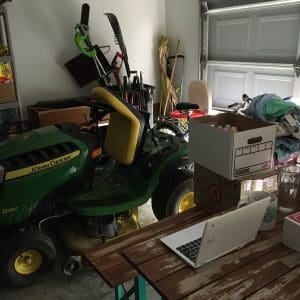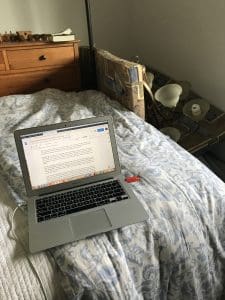Editor’s note: When we changed the 2020 Library Publishing Forum to a virtual conference format, we gave presenters the option of converting their presentations into blog posts. This is a guest post in that series. In this case, the post is also an entry in the ongoing Fellows Journal series.
By Talea Anderson (Washington State University) and AJ Boston (Murray State University), 2019-21 Library Publishing Coalition Fellows
AJ Boston, Apr. 24: Hi Talea. Thanks for agreeing to transition our Fellows Forum panel for the 2020 Forum into this collaborative blog post. The way I imagine this going is that we write back and forth in a shared Google Doc, prompt each other about the topics we broadly recognize the other had an interest in speaking about at the Forum, and then spiral out organically from there. A caveat to that “organically” being that we can edit and condense as we go along. (I’ll refrain from editing this initial block of text, for the sake of the reader.) Before I hop into some of the questions I have about your experience as an LPC Fellow, is there anything you want to add?
Talea Anderson, Apr. 27: Thanks, AJ—this sounds great. You know, the first thing that comes to mind is how you talked early on in the fellowship about your experience with libraries and library publishing as a parent. I think, in light of COVID-19, that type of reflection might be of particular interest to others in this community. It’s so challenging right now juggling work, kids…mental health….
AJ, Apr. 27-28: Yes! I saw someone on Twitter say they wanted to give 100% to parenting or working, rather than half-assing both. I feel like that. Our five-person household has been homebound almost every day for the past six weeks. Within that span of time, I was originally scheduled to attend the Library Tech Conference, present at the in-person Library Publishing Forum, and coordinate my campus student scholars week.
The last thing I did in-person was coordinate a statewide student poster event at our capitol in March. Virus warning signs were beginning to really register, but public response hadn’t caught up yet. The SXSW cancellation announcement came just the day after we held our event, and that was the first Big Announcement that I can recall. LPC announced the cancellation of the in-person Forum on the following Monday. I felt guilty not canceling our poster event, but I was still bouncing back from a tremendous family loss a couple weeks earlier. In hindsight, I see why my judgment was cloudy.
The campus scholars week event I coordinate was scheduled for April, and by that time students were attending class remotely. I was working from home by then too. In light of the burden that students and teachers were facing with the transition to remote learning, we held a virtual version for those students who genuinely needed the opportunity and we postponed work on our companion student journal. A fraction of the students who would normally have participated did so; I respect each student who opted out. I wasn’t teaching this semester, so I can only imagine what this abrupt shift has been like for them. My closest glimpse to the post-apocalyptic Zoomiverse is my service on the LPC Program Committee.
Our fearless Program Committee chair, Laureen Boutang, and the incredible LPC staff (Caitlin, Hannah, Melanie, Nancy) have worked diligently to guide the committee in transitioning the Forum into an online format. Shoutout to the whole committee (Johanna, Justin, Liz, Matt, Regina, Robin, Sarah, Sonya) for stepping up to the plate to make this new format work. Since October 2019, I’ve participated in Program Committee Zoom calls and gained valuable experience from working alongside that group, reviewing submissions, and participating in active bystander training sessions. I was looking forward to capping off all that “thinking” work with the chance to put it into practice in Worcester.

I’ve not volunteered to serve as one of the virtual room hosts at the Forum. This blog post is perhaps something of a compromise, too, relative to a live-streamed panel. The guilt is sort of an ambient feature at this point, like the birds chirping or the windchime on our tree. Working from my garage on a dinky single-monitor Chromebook with my kids alternately crying to watch “Paw Patrol” or asking for a push on the swing in the background… this is just about as good as I’ve got to give right now. Another tweet-type in the COVID genre are those pointing out that the momentary discomforts and hurdles that privileged folks (like me) are experiencing is business as usual for underprivileged folks.
Talea, you recently spoke about accessibility topics in Oslo, Norway. You also worked on the LPC’s Research Committee, and have had regular mentor meetings with Anita Walz. I anticipate your perspective will expand mine. Tell me about your experience?
TA, Apr. 28: Oh, goodness—completely relate to the feeling of being half-there on everything (even though I don’t have kids to compound the feeling). The other day I balanced a computer on my bed and recorded some videos while the next-door neighbor attacked his fence with a chainsaw. (Ok, maybe not, but it sounded like it.) I just had to think, these are strange times indeed.

But yes: accessibility. Just before everything fell apart, I was in Oslo and then Reykjavik. I spoke about the accessibility of institutional repositories at the IFLA Library Publishing SIG meeting at Oslo Metropolitan University. It was interesting talking afterwards with our colleagues in Norway who are confronting similar issues with limited staffing, limited resources, and noncompliant vendors.
I made it home and straight into quarantine on March 15 and have been alone or at my parents’ place since. This time has really left me thinking about the privilege many of us have to travel freely. Europe was a privilege–absolutely. But I also think about the people right now who have difficulty getting groceries and ordinary things under COVID conditions (I can personally attest to the challenge of buying two weeks’ worth of groceries in the absence of a vehicle or driver’s license). Not to dwell on COVID matters but I know I’ll continue to reflect post-quarantine about what I take for granted in terms of mobility and access to resources.
Accessibility of library resources has still been on my mind while working from home. For instance, Anita and I have talked about some of the challenges she’s faced when it comes to math/engineering notation in OER. Exporting PDFs from Pressbooks is tricky because accessibility features are easily lost, meaning that those STEM notations can end up with meaningless tags that aren’t helpful to students using screen readers. Overall, although I still see accessibility as a daunting issue across the board, I’m really blown away by the effort Anita and other colleagues routinely put into hunting down solutions.
I’ve also continued working with the LPC Research Committee, and I’m excited about having more conversations in the months to come about the research agenda they’ve outlined (accessibility is on it!). More than ever, right now I appreciate having built-in opportunities to continue talking to colleagues scattered across the country.
I suppose we’ve rambled on a bit with updates but do you have any other thoughts, AJ, about upcoming projects or life in the Post-COVID Times? Or as Kumail Nanjiani and Emily Gordon like to refer to it on their podcast (Staying In), do you have thoughts about life in the Post-Weirds? Or other concluding thoughts?
AJ, Apr. 29: Projects. Oh, projects. I should note that Kevin Hawkins has been my (awesome) mentor during this Fellowship. In February, he recommended we brainstorm a proposal for the Scholarly Communication Institute. We had just coalesced around an idea when, of course, SCI announced their cancellation in March. Loosely, we were considering practices that make technical research more accessible to laypeople. Separate from that proposal with Kevin, but related in content, there is a half-finished IRB application sitting on my office PC about academic podcasting. I’m very excited to check out Michelle Wilson’s “This Workshop is a Podcast” panel at #LPForum20. And speaking of podcasts, I’ll have to check out the podcast you mentioned.
Thank you for sharing your experience with the difficulties in stocking up on groceries without a car or drivers license. The online store pick-up service that grocers are offering has been a huge help to our family and elderly family-friends during this time. I acknowledge the extreme burden grocery workers have been under, but what was less apparent to me was how folks without the ability to drive (or access to home-delivery services) are not directly benefiting from those services. Our current food shopping situation sort of rhymes with the online education delivery challenges occurring where, yes, content can take on a more digital delivery process in a pinch, but that is heavily dependent on the instructor’s ability to put it there and the student’s ability to receive it. The same can be said of conferences.
Talea, I appreciate your willingness to experiment here, and I hope this format has been a suitable substitute for you. The Fellowship had generously granted us a slot to speak at the Forum. With the shift to virtual, we had the option to pre-record or live-stream a presentation. This collaborative blog post, I thought, would give us the sensation of the reciprocal exchange that one experiences in best case conference presentation scenarios. On a simpler, more humane level, this was the medium that I felt most comfortable with. I have methods for imbuing nuance into communication, whether delivered in person or in writing, that I simply have not figured out how to replicate on Zoom. I think I’ve said what I had intended to express in this space, so I will sign off here to let you have the final word!
Talea, Apr. 29: Ah, SCI! Yes, Anita and I had also been discussing a potential proposal related to accessibility. It was a bummer to see that option slip away but perhaps next year we can try again.
(As a side note, if you ever want to collaborate on a project related to podcasts…I’m a bit of a podcast-listening fiend. I may have something like a hundred subscriptions at this point. I’ll add that my colleagues at the Center for Digital Scholarship and Curation at WSU are starting some interesting projects related to podcast creation by Native American communities. So cool.)
It’s a good point about grocery home delivery. I’ve been impressed with the rollout of those options. It seems to work well in some locations and I hope I can make use of that kind of service someday. The whole grocery thing has made me think a lot about how assistance is often offered to disabled communities on an “at request” basis. I find that I often have options for accessing this or that service but I have to request assistance to do so. I’d love to figure out how to go another way when working with accessibility in IRs and library publishing generally.
Thanks for proposing this venue for having a conversation! I think everybody is suffering from a little Zoom-burnout. I also take my hat off to any parent who’s navigating work life during this time. You all are amazing. Take care, and looking forward to (perhaps) catching a glimpse of you next week at LPF!
